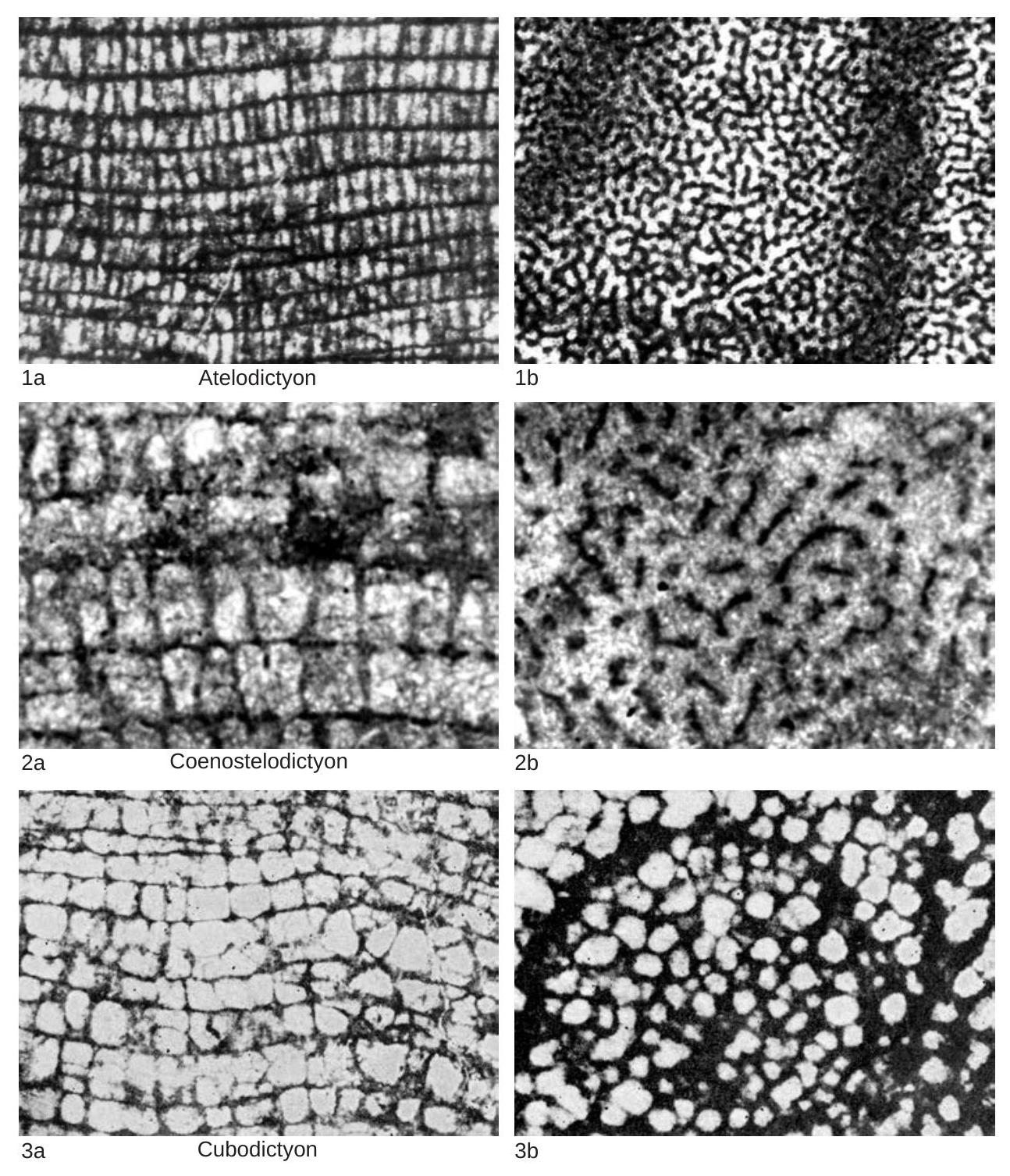Welcome to the Treatise on Invertebrate Paleontology!
Please enter a genera name to retrieve more information.

Atelodictyon
Classification
Phylum:
Porifera
Class:
Stromatoporoidea
Order:
Clathrodictyida
Family:
Atelodictyidae
Formal Genus Name and Reference:
Atelodictyon Lecompte, 1951 in 1951–1952, p. 124
Type Species:
A. fallax Lecompte, 1951 in 1951–1952, p. 125; OD; holotype IRScNB 7411
Images
(Click to enlarge in a new window)
Fig. 423,1a–b. *A. fallax, Couvinian, Eifelian, Dinant Basin, Belgium, holotype IRScNB 7411; longitudinal and tangential sections, X10 (Nestor, 2011, courtesy of C. W. Stearn).
Synonyms
Aculatostroma
Geographic Distribution
Australia (northern Queensland, Victoria), central Asia (Tien Shan), Russia (Kuznetsk Basin, northeastern Siberia), Lower Devonian; Afghanistan, Austria, Belgium, China (Quizhou), France (Boulonnais), Poland, Russia (Kuznetsk Basin, northeastern Siberia, Urals), United States (Indiana), Middle Devonian; Canada (Alberta), Czech Republic (Moravia), Poland, Russia (Kuznetsk Basin, northeastern Siberia, Russian Platform), United States (Iowa), Upper Devonian; Belgium, Germany, Kazakhstan, upper Famennian.
Age Range
Beginning Stage in Treatise Usage:
Lower Devonian
Beginning International Stage:
Lochkovian
Fraction Up In Beginning Stage:
0
Beginning Date:
419
Ending Stage in Treatise Usage:
Upper Devonian (upper Famennian)
Ending International Stage:
Famennian
Fraction Up In Ending Stage:
100
Ending Date:
359.3
Description
Growth form laminar or domical; laminae continuous, planar, thin; pillars bladelike, laterally joined in chains, short to superposed; galleries labyrinthine in tangential section, rectangular in longitudinal section; astrorhizae rare. [The original figures of Syringostroma verrucosum (Khalfina, 1961d, pl. D13,3a–b), designated as the type species of the genus Aculatostroma Khalfina, 1968b, clearly demonstrate that it has continuous laminae and so-called hexactinellid structure in the interlaminar space. Therefore, Aculatostroma is treated as a junior synonym of Atelodictyon.]
References
Museum or Author Information
Classification
Phylum:
Porifera
Class:
Stromatoporoidea
Order:
Clathrodictyida
Family:
Atelodictyidae
Formal Genus Name and Reference:
Atelodictyon Lecompte, 1951 in 1951–1952, p. 124
Type Species:
A. fallax Lecompte, 1951 in 1951–1952, p. 125; OD; holotype IRScNB 7411
Images
(Click to enlarge in a new window)
Fig. 423,1a–b. *A. fallax, Couvinian, Eifelian, Dinant Basin, Belgium, holotype IRScNB 7411; longitudinal and tangential sections, X10 (Nestor, 2011, courtesy of C. W. Stearn).
Synonyms
Aculatostroma
Geographic Distribution
Australia (northern Queensland, Victoria), central Asia (Tien Shan), Russia (Kuznetsk Basin, northeastern Siberia), Lower Devonian; Afghanistan, Austria, Belgium, China (Quizhou), France (Boulonnais), Poland, Russia (Kuznetsk Basin, northeastern Siberia, Urals), United States (Indiana), Middle Devonian; Canada (Alberta), Czech Republic (Moravia), Poland, Russia (Kuznetsk Basin, northeastern Siberia, Russian Platform), United States (Iowa), Upper Devonian; Belgium, Germany, Kazakhstan, upper Famennian.
Age Range
Beginning Stage in Treatise Usage:
Lower Devonian
Beginning International Stage:
Lochkovian
Fraction Up In Beginning Stage:
0
Beginning Date:
419
Ending Stage in Treatise Usage:
Upper Devonian (upper Famennian)
Ending International Stage:
Famennian
Fraction Up In Ending Stage:
100
Ending Date:
359.3
Description
Growth form laminar or domical; laminae continuous, planar, thin; pillars bladelike, laterally joined in chains, short to superposed; galleries labyrinthine in tangential section, rectangular in longitudinal section; astrorhizae rare. [The original figures of Syringostroma verrucosum (Khalfina, 1961d, pl. D13,3a–b), designated as the type species of the genus Aculatostroma Khalfina, 1968b, clearly demonstrate that it has continuous laminae and so-called hexactinellid structure in the interlaminar space. Therefore, Aculatostroma is treated as a junior synonym of Atelodictyon.]
